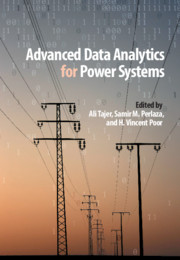Book contents
- Frontmatter
- Contents
- List of Contributors
- Preface
- Part I Statistical Learning
- Part II Data-Driven Anomaly Detection
- Part III Data Quality, Integrity, and Privacy
- Part IV Signal Processing
- 12 A Data Analytics Perspective of Fundamental Power Grid Analysis Techniques
- 13 Graph Signal Processing for the Power Grid
- 14 A Sparse Representation Approach for Anomaly Identification
- Part V Large-Scale Optimization
- Part VI Game Theory
- Index
12 - A Data Analytics Perspective of Fundamental Power Grid Analysis Techniques
from Part IV - Signal Processing
Published online by Cambridge University Press: 22 March 2021
- Frontmatter
- Contents
- List of Contributors
- Preface
- Part I Statistical Learning
- Part II Data-Driven Anomaly Detection
- Part III Data Quality, Integrity, and Privacy
- Part IV Signal Processing
- 12 A Data Analytics Perspective of Fundamental Power Grid Analysis Techniques
- 13 Graph Signal Processing for the Power Grid
- 14 A Sparse Representation Approach for Anomaly Identification
- Part V Large-Scale Optimization
- Part VI Game Theory
- Index
Summary
The problem of tracking the system frequency is ubiquitous in power systems. However, despite numerous empirical comparative studies of various algorithms, the underlying links and commonalities between frequency tracking methods are often overlooked. To this end, we show that the treatment of the two best known frequency estimation methodologies: (i) tracking the rate of change of the voltage phasor angles, and (ii) fixed frequency demodulation, can be unified, whereby the former can be interpreted as a special case of the latter. Furthermore, we show that the frequency estimator derived from the difference in the phase angle is the maximum likelihood frequency estimator of a nonstationary sinusoid. Drawing upon the data analytics interpretation of the Clarke and related transforms in power system analysis as practical Principal Component Analyzers (PCA), we then set out to explore commonalities between classic frequency estimation techniques and widely linear modeling. The so-obtained additional degrees of freedom allow us to arrive at the adaptive Smart Clarke and Smart Park transforms (SCT and SPT), which are shown to operate in an unbiased and statistically consistent way for both standard and dynamically unbalanced smart grids. Overall, this work suggest avenues for next generation solutions for the analysis of modern grids that are not accessible from the Circuit Theory perspective.
- Type
- Chapter
- Information
- Advanced Data Analytics for Power Systems , pp. 285 - 311Publisher: Cambridge University PressPrint publication year: 2021

